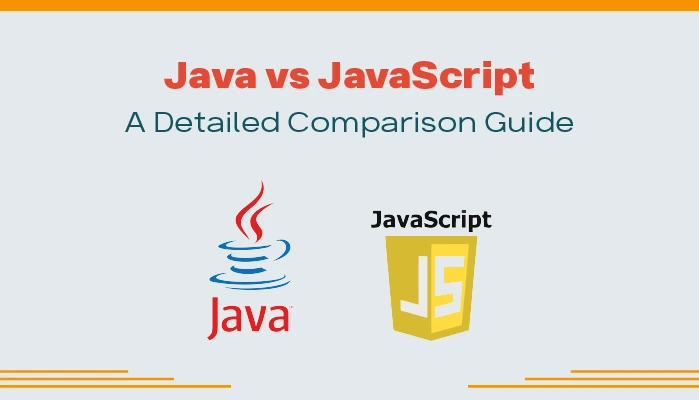When considering Java vs JavaScript, you’ll notice a few difference between Java and JavaScript. Java and JavaScript are different despite their similar names. Java is versatile, compiled, and used in various applications, while JavaScript is interpreted and enhances interactivity on web pages. Knowing their strengths helps developers choose the right tool for different tasks. Java is used in web, mobile, and enterprise-level systems, while JavaScript is mainly for web development, making user experiences dynamic and engaging.
What is Java?
Java, a versatile and object-oriented programming language crafted by Sun Microsystems, stands out for its platform independence. Thanks to the Java Virtual Machine (JVM), programs can effortlessly run on various devices. Beyond this, it champions code reusability, facilitates multithreading, and incorporates automatic memory management. Its extensive standard library makes Java a go-to for applications, ranging from web and mobile development to robust enterprise-level systems.
Features of Java
Java is a strong and flexible programming language known for working on any device. It uses simple principles, has many ready-to-use functions, supports doing many tasks at once, manages memory automatically, and ensures secure applications for various uses.
Java is simple for beginners and works well for various tasks. It can handle distributed computing, making apps scalable. Despite being seen as interpreted, its just-in-time compilation makes it fast. Dynamic loading and reflection APIs contribute to its popularity in web, Android, and business apps.
In the conflict of Java vs JavaScript People love Java because it has strong principles and useful features for different things. It works on many devices, is safe, and is a top pick for making flexible and secure apps. Java keeps evolving, has lots of community help, and stays important in making software.
What is Java used for?
Java is a flexible language that’s used for many different things in lots of areas. Some common uses of Java include:
- Web Development: Java is often used to make websites more interesting. People use special tools like Spring and JavaServer Faces to build strong and reliable web applications.
- Mobile App Development: Main language for making apps on Android. Android Studio, the official tool for creating Android apps, uses Java and Kotlin to build mobile applications.
- Desktop Applications: Java can make programs that work on different types of computers. Tools like JavaFX or Swing help developers create these applications, making them easy to use on various operating systems without changing anything.
- Cloud Computing: Used in the cloud, where computer services are provided online. Many cloud programs and parts are made with Java because it can handle a lot, is dependable, and works on different systems.
- Big Data Technologies: Java is often used for working with big data in programs like Apache Hadoop and Apache Spark. It’s good at handling a lot of data quickly, making it a popular choice for big data analysis.
- Game Development: Used to make video games, especially with tools like LibGDX. This helps create games that can work on different types of devices.
- Embedded Systems: Java’s portability and platform independence make it suitable for developing applications for embedded systems, where resource efficiency and cross-platform compatibility are crucial.
In the conflict of Java vs JavaScript, Java is used a lot in different areas because it can easily adapt, work on many devices, and has lots of helpful tools, making it a valuable language for making software.
Advantages of Java
Picking the right programming language is important, especially when thinking about Java vs JavaScript. Java is special because it has many helpful features like:
- Versatility Across Various Applications: Java is a useful language that can do many things, like making websites, mobile apps, and big business systems. People like it because it works well for lots of different projects.
- Write Once, Run Anywhere (WORA): Java is cool because you can write your program once, and it works on lots of different devices and systems. This makes it easier to make programs that work on many things.
- Object-Oriented Programming (OOP) Paradigm: Java is helpful because it organizes code in a smart way called “object-oriented programming.” This way, you can use your code over and over again, and it keeps your programs strong and dependable.
- Robust Error Checking and Type Safety: Java is good at finding and fixing mistakes in your code, making sure your programs are strong and work well. It checks for errors early on, so problems don’t happen when people use your programs.
- Security First: Java is safe to use because it has special features to keep things secure in the digital world. It creates a safe space for programs to run, making it a good choice when protecting important information is important.
- Thriving Community Support: People all around the world use Java and help each other out. Online places make it easy for them to share information and talk, giving developers good ways to learn and find the best ways to use Java.
- IoT Development Made Seamless: When you compare Java and JavaScript, Java is great for making Internet of Things (IoT) apps. It’s easy to use, works on different devices, and has safety features, making it a good choice for strong and dependable IoT solutions.
Disadvantages of Java
Java has some downsides like it might not be as fast due to the Java Virtual Machine, it can use a lot of memory, and the code can be long and complex. Some people also say it takes longer to start compared to other languages.
What is JavaScript?
When comparing Java vs JavaScript, remember that JavaScript is a type of computer language that’s useful for making websites more interesting. It works in web browsers, helping developers add cool and interactive things to web pages, making them look and feel better for users.
Features of JavaScript
JavaScript is important for making websites fun and interactive. It helps create dynamic pages, supports doing many things at once, and allows cool interactions. It works well on different browsers and manages web page parts efficiently. With many extra tools available, JavaScript can handle tasks on both the user’s computer and the server, making web pages work nicely on all devices.
What is JavaScript Used For?
JavaScript is super popular and used by almost every website. With over 1.98 billion websites out there, most of them use JavaScript to make their pages go from plain to interactive, like magic, right in your web browser, making the internet more fun for users.
But here’s the cool part, JavaScript isn’t just for the front of websites. It also works in Node, doing things like handling routes and functions on the back end. Node makes JavaScript a full package for both the front and back of websites.
In the Java vs JavaScript comparison, know that with JavaScript, you can create games ideal for mobile devices and browsers, making development versatile for various devices.
Advantages of JavaScript
JavaScript is really useful because it works in web browsers, and lots of people use it. It’s been the top language on GitHub for a while. Since web browsers are on many things like computers, tablets, phones, and even game consoles and smart TVs, JavaScript is used everywhere.
When you look at Java and JavaScript for making websites, JavaScript is a great pick because it’s versatile. If you’re a full-stack engineer, you don’t have to learn lots of languages, just different ways of doing things. You can use the same rules to make everything work.
Disadvantages of JavaScript
When looking at Java vs JavaScript, remember that all modern browsers use JavaScript, but they might act a bit differently. Each browser has a special engine, like Chrome and Brave using the V8 engine, and Firefox using SpiderMonkey. Usually, they understand the code the same, but sometimes there can be unexpected differences. But don’t worry, there are ways to fix these issues with help from resources.
Even though some people think relying on the browser is a problem for JavaScript, it’s not entirely true. JavaScript can now work in different places using Node. With tools like React Native, you can make apps for Windows, Mac OS, iOS, and Android. Just know, there’s a bit of learning to do.
Also, speed is something to think about. When we talk about programming languages, they’re doing fast and complex math. JavaScript is a high-level language, a bit different from how computers work. Making the complicated math simpler for the computer takes some time. It’s not a lot for people, but you might notice it if a lot is going on, like many functions and calculations.
Difference Between Java and JavaScript – Java vs JavaScript
Java and JavaScript are like two different languages for computers, and they each have their jobs and ways of doing things. Now, let’s explore the Java and JavaScript differences or we can say the difference between JavaScript and Java programming:
| Aspects | Java | JavaScript |
|---|---|---|
|
Type |
Compiled |
Interpreted |
|
Execution Location |
Server-side |
Client-side (web browsers) |
|
Usage |
Versatile (standalone, mobile, etc.) |
Primarily for web development |
|
Typing |
Statically typed |
Dynamically typed |
|
Compilation |
Diverse applications, enterprise |
Web development, enhancing user interfaces |
Java vs JavaScript Syntax
Let’s checkout the Java and JavaScript syntax below before proceeding with the program example.
- JavaScript: JavaScript Syntax is like a set of rules that tells you how to write JavaScript code. You have to follow these rules to work with JavaScript.
Syntax-
|
console.log(“This is a Basic Print method in JavaScript”); |
JavaScript syntax is like a set of rules that tells us how to build JavaScript programs.
|
// Variable declaration let c, d, e; // Assign a value to the variable c = 5; // Computer value of variables d = c; e = c/d; |
- Java: Java syntax is like a set of rules that tells you how to write Java code. You have to follow these rules to work with Java.
|
import java.util.*; public class TC { public static void main(String[] args) { System.out.println(“Techcrix”); } } |
|
Output:- Techcrix |
Java and JavaScript Example
Java is used for many things like backend systems, desktop apps, and Android mobile apps. On the other hand, JavaScript is mainly used to make interactive web pages and work on the front end of websites.
The following are the difference of Java and JavaScript programs:
|
Java Example: public class HelloWorld { public static void main(String[] args) { System.out.println(“Hello, World! This is Java.”); } } |
In this Java example, a straightforward program is developed to print “Hello, World!” to the console. Notably, Java code follows a typical process of compilation before execution.
|
JavaScript Example: <!DOCTYPE html> <html> <head> <title>JavaScript Example</title> <script> // JavaScript code embedded in HTML function sayHello() { document.getElementById(“output”).innerHTML = “Hello, World! This is JavaScript.”; } </script> </head> <body> <h1>JavaScript Example</h1> <button onclick=”sayHello()”>Say Hello</button> <p id=”output”></p> </body> </html> |
In this example with JavaScript, a basic web page has a button and a paragraph. When you click the button, it runs a function called `sayHello` that changes the paragraph to say “Hello, World! This is JavaScript.” The JavaScript code works right in the web browser.
Read More: Best Way to Use Google Bard AI Chatbot
Conclusion
In conclusion, Java and JavaScript have different jobs in programming. Java, which is compiled, is great for many types of projects, thanks to its flexibility and support from a strong community. Meanwhile, JavaScript, interpreted and used in web development, makes websites interactive. Java works well in backend systems and mobile apps, while JavaScript focuses on making websites better for users. Knowing these differences between Java vs JavaScript, helps developers to use each language where it’s most effective.
Frequently Asked Questions
Q. Should I learn Java or JavaScript
Ans. Consider your goals. You can opt for Java for versatile applications and backend, while JavaScript is ideal for web development and frontend. Alternatively, learn both for versatility.
Q. Can I learn JavaScript without Java?
Ans. You can learn JavaScript independently. Despite similar names, JavaScript and Java are distinct, and prior knowledge of Java isn’t necessary for learning JavaScript.

Ankit Roy is a professional Technical Content Developer, Freelancer, and blogger. He holds a Masters’s degree in Computer Science and has worked as a Digital Marketing Strategist. With a deep understanding of technology trends like AI, ML, Big Data, Neural Networks, Network Infrastructure, etc., Ankit is able to communicate complex technical concepts in a clear and concise manner. He is a regular contributor to several websites and has authored numerous technical guides and instructional materials. In his free time, Ankit enjoys tinkering with new technologies and staying up-to-date with the latest developments in the field.




